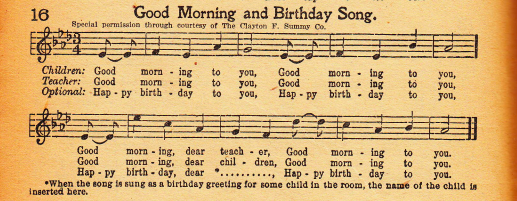
The company that claims to own "Happy Birthday" shot back yesterday at what has been described as "smoking gun" evidence that the world's most famous song is not copyrighted.
Lawyers for a filmmaker seeking to knock out the copyright found a 1922 songbook that features the lyrics of "Happy Birthday," published without a copyright notice but with a notice giving "special permission through courtesy of the Clayton F. Summy Co." On Monday, they filed an application saying that the notice warrants ending the case. Publishing the lyrics without a copyright notice should have forfeited any copyright, and even if it didn't, copyright on the 1922 songbook expired in 1949.
Warner/Chappell Music, believed to collect around $2 million per year from licensing "Happy Birthday," filed a response (PDF) yesterday, saying that the new evidence at most creates issues that can be resolved at trial.A 1922 publication doesn't get rid of the "common law copyright" belonging to authors Jessica and Patty Hill, according to Warner's lawyers, unless it had the "necessary authorization from the copyright owner." And there's no telling what the "special permission" granted by the Summy Co. really means.
"That statement does not say what the 'special permission' was for," wrote Warner's lawyers. "Was it for Good Morning to All only? Was it for that work in combination with the 'Happy Birthday' lyrics?"
Patty Hill testified in 1942 that she wasn't aware of any publication that contained the "Good Morning to You" lyrics "with her permission," they noted. And Summy's own 1935 copyright registration shows that the company didn't believe there was any pre-1935 publication "with the authority of the copyright owners."
Essentially, Warner is saying that the lyrics in The Everyday Song Book may be piratical copies. "It is possible that The Cable Company's applications and/or deposit copies to the Copyright Office might have some further information bearing on these matters, although we have not seen these," they added.
In their new filing, Warner also responded to the suggestion in the plaintiffs' motion that they weren't playing fair with the documents. "Warner/Chappell was not hiding that or other documents or proceeding in bad faith," they wrote.
When it reviewed microfilm files owned by Alfred Publishing, a company that had bought Warner Music Group's sheet music business in 2005, Warner attorneys "did not find anything related to the deposit copy or any other issue.... And, to be clear, we did not notice the blurred text on the sheet music printed by The Cable Company," that is, the "special permission" line.
In 2015, Warner/Chappell lawyers "again conducted a review of third party files" to determine if there were documents that could be needed "in the event the Court were to open historical issues and order a trial." As part of that review, it acquired a 1935 deposit of "Happy Birthday to You!" from the British Museum. That move somehow caused a reconsideration of what documents were discoverable, and the supplementary discovery was made.
A hearing is scheduled in the now two-year-old case today in Los Angeles federal court.
reader comments
173